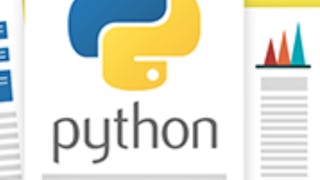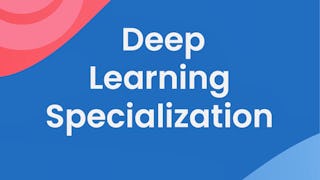Filter by
SubjectRequired
LanguageRequired
The language used throughout the course, in both instruction and assessments.
Learning ProductRequired
LevelRequired
DurationRequired
SkillsRequired
SubtitlesRequired
EducatorRequired
Explore the Organizational Analysis Course Catalog

S.P. Jain Institute of Management and Research
Skills you'll gain: Data Analysis, Quantitative Research, Statistical Hypothesis Testing, Sampling (Statistics), Descriptive Statistics, Business Analytics, Regression Analysis, Business Mathematics, Data-Driven Decision-Making, Statistical Analysis, Probability Distribution, Microsoft Excel, Statistical Inference, Probability, Variance Analysis, Estimation
 Status: Free Trial
Status: Free TrialSkills you'll gain: Predictive Modeling, Exploratory Data Analysis, Data Wrangling, Data Analysis, Data Import/Export, Pandas (Python Package), Statistical Modeling, Data-Driven Decision-Making, Data Manipulation, Scikit Learn (Machine Learning Library), Regression Analysis, Feature Engineering, Matplotlib, Python Programming, Data Cleansing, NumPy, Data Visualization, Descriptive Statistics, Supervised Learning, Data Pipelines
 Status: Free Trial
Status: Free TrialSkills you'll gain: SQL, Databases, Stored Procedure, Relational Databases, Database Design, Query Languages, Database Management, Data Analysis, Jupyter, Data Manipulation, Pandas (Python Package), Python Programming, Transaction Processing
 Status: Free Trial
Status: Free TrialDeepLearning.AI
Skills you'll gain: Computer Vision, Deep Learning, Image Analysis, Natural Language Processing, Artificial Neural Networks, Tensorflow, Supervised Learning, Large Language Modeling, Artificial Intelligence and Machine Learning (AI/ML), Artificial Intelligence, Applied Machine Learning, PyTorch (Machine Learning Library), Machine Learning, Debugging, Performance Tuning, Keras (Neural Network Library), Python Programming, Machine Learning Algorithms, Linear Algebra, Analysis
 Status: Free Trial
Status: Free TrialSkills you'll gain: Exploratory Data Analysis, Feature Engineering, Statistical Inference, Statistical Hypothesis Testing, Data Processing, Data Access, Anomaly Detection, Statistical Analysis, Data Analysis, Data Cleansing, Data Manipulation, Machine Learning, Probability & Statistics, Data Transformation, Workflow Management, Scalability
 Status: Free Trial
Status: Free TrialUniversity of California, Davis
Skills you'll gain: Data Storytelling, Dashboard, Key Performance Indicators (KPIs), Tableau Software, Data Visualization, Data Presentation, Data Mapping, Interactive Data Visualization, Data Visualization Software, Data Literacy, Proposal Development, Exploratory Data Analysis, Data Ethics, Graphing, Histogram, Scatter Plots, Tree Maps, Data-Driven Decision-Making, Statistical Visualization, Storyboarding
 Status: Free TrialStatus: AI skills
Status: Free TrialStatus: AI skillsSkills you'll gain: Data Storytelling, Dashboard, Data Visualization Software, Plotly, Data Visualization, SQL, Predictive Modeling, Generative AI, Interactive Data Visualization, Exploratory Data Analysis, Data Wrangling, Data Analysis, Big Data, Matplotlib, IBM Cognos Analytics, Excel Formulas, Professional Networking, Data Import/Export, Microsoft Excel, Python Programming
 Status: Free Trial
Status: Free TrialSkills you'll gain: Data Ethics, Data Analysis, Data-Driven Decision-Making, Google Sheets, Spreadsheet Software, Analytical Skills, Data Sharing, Data Cleansing, Data Processing, Data Visualization Software, Data Visualization, SQL, Data Management
 Status: Free Trial
Status: Free TrialUniversity of Illinois Urbana-Champaign
Skills you'll gain: Descriptive Statistics, Supply And Demand, Market Dynamics, Sampling (Statistics), Statistical Inference, Business Analytics, Financial Systems, Financial Policy, Banking, Probability Distribution, Analytics, Statistical Analysis, Statistics, Regression Analysis, Data-Driven Decision-Making, Microsoft Excel, Business Mathematics, Statistical Methods, Economics, Statistical Hypothesis Testing
 Status: Free Trial
Status: Free TrialVanderbilt University
Skills you'll gain: Prompt Engineering, Data Presentation, ChatGPT, Document Management, Artificial Intelligence, Microsoft Excel, Problem Solving, Data Analysis, Generative AI, Information Management, File Management, Creativity, Automation
 Status: Free Trial
Status: Free TrialJohns Hopkins University
Skills you'll gain: Regression Analysis, Statistical Analysis, Statistical Modeling, Data Science, Predictive Modeling, Probability & Statistics, Statistical Inference
 Status: Free TrialStatus: AI skills
Status: Free TrialStatus: AI skillsSkills you'll gain: Paid media, Social Media Marketing, Social Media Management, Social Media, Marketing Analytics, Target Audience, Marketing Budgets, Social Media Strategy, Social Media Campaigns, Instagram, Content Creation, Campaign Management, Marketing Effectiveness, Marketing, Performance Analysis, Key Performance Indicators (KPIs), Goal Setting, Advertising, Brand Management, Digital Marketing
Organizational Analysis learners also search
In summary, here are 10 of our most popular organizational analysis courses
- Data Analysis: S.P. Jain Institute of Management and Research
- Data Analysis with Python: IBM
- Databases and SQL for Data Science with Python: IBM
- Deep Learning: DeepLearning.AI
- Exploratory Data Analysis for Machine Learning: IBM
- Data Visualization with Tableau: University of California, Davis
- IBM Data Analyst: IBM
- Foundations: Data, Data, Everywhere: Google
- Managerial Economics and Business Analysis: University of Illinois Urbana-Champaign
- ChatGPT Advanced Data Analysis: Vanderbilt University










